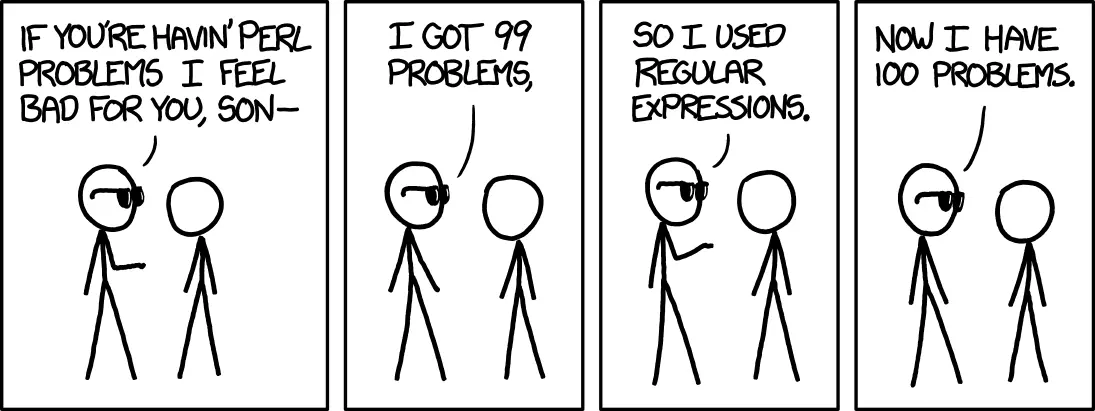^.?$|^(..+?)\1+$
<answer>
Matches strings of any character repeated a non-prime number of times
Relevant xkcd:

The pipe is throwing me off because usually I have to do parentheses for that to work…
knowing Matt Parker it only matches prime numbers or multiples of e or something.
looks at <ansewer>
Yeah see?
Matt Parker will destroy us all! (https://youtu.be/GyNbLtiAgj4?si=r77Ef7wm9EZ83T6J)
For a second I thought I was still in the thread about monkeys face-rolling typewriters until the heat death of the universe not eventually producing Hamlet
no
that is correct!
Looks like APL to me.
Just waiting for the oppertunity to hide this in prod.
…either an empty string, a single character, or the same sequence of characters repeated more than once?
Syntactically valid Perl
Something like
!“A line with exactly 0 or 1 characters, or a line with a sequence of 1 or 3 or more characters, repeated at least twice”!<
It’s a line with a sequence of two or more characters repeated at least twice.
Only the part after the pipe character. The pipe character works as an “or” operator. RegalPotoo is right.
They said—
A line with exactly 0 or 1 characters, or a line with a sequence of 1 or 3 or more characters, repeated at least twice
Note—
…or a line with a sequence of 1 or 3 or more characters, repeated at least twice
It should be—
…or a line with a sequence of 2 or more characters, repeated at least twice
The regex in the post will match “abab”. Their original description (line 2 of this comment) will not match “abab”.
I agree, you’re right about the part after the pipe and RegalPotoo’s explanation was not entirely correct.
You’re misreading the
..+?part. That means 2 or more characters, non greedy.
It matches “yo momma”.
All my homies hate regexs. That’s actually the best use case I found for LLMs so far : I just tell it what I want it to match or not match, and it usually spits out a decent one
Oooof. I feel like trying to figure out what’s wrong with some regex I didn’t write is much harder than writing it myself personally.
That sounds…
Easier to get almost right than actually learning the subject.
Much, much harder to get completely right than actually learning the subject.
So yes, basically the archetypal use case for LLMs.
I’m going to assume the answer is a magic square attempt that just isn’t very good
It matches for non-primes and doesn’t match for primes.
A non prime number of times… It looks like the string of characters could repeat number of times because the whole capture group repeats. I don’t see a prime constraint.
The capture group must be the same each time it repeats, so the number of characters stays the same. So X groups of Y characters = string of length X*Y. X and Y can be anything so any string length that can be made by multiplying two numbers-- which is every non-prime string length-- is matched. 0 and 1 are handled specially at the start.
This is brilliantly disgusting.
Literal interpretation of the regex
The regex matches either a line with a single character or a line with a sequence of two or more characters that’s repeated two or more times. For some examples: the regex matches “a”, “b”, “abab”, “ababab”, “aaaa”, and “bbbbbb”, but does not match “aa”, “bb”, “aaa”, “ab”, “aba”, or “ababa”.
Hint for the special thing it matches
For a line with a single character repeated n times, what does matching (or not matching) this regex say about the number n?
You forgot empty line. Since first part is
^.?$it’s one or zero of any character.







